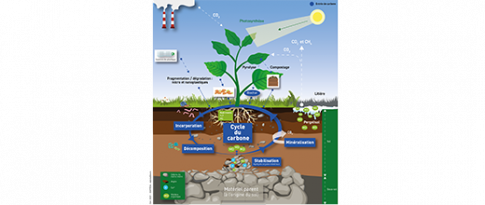18.10.2022
5 minutes of reading
Carbon sinks: What role for research in accelerating their development in France?
As a contribution to the European and National objective of achieving carbon neutrality by 2050, there is a growing initiatives of foresight studies aimed at anticipating and accelerating the deployment of solutions to reduce and to eliminate CO2 from the atmosphere.
Based on sectoral emission reduction trajectories, most of these studies use negative emission solutions – or carbon sinks – to a greater or lesser extent, making it possible to compensate for fossil CO2 emissions that would be too difficult to reduce in the next three decades.
These carbon sinks are a solution that is now considered unavoidable. Increasing but also preserving carbon sinks and, in some cases, restoring them, are therefore priority issues.
As a result of a study by a group of experts from the ANCRE alliance, including experts from IFPEN, six main categories of carbon sink solutions have been identified for the French context: three categories of natural CO2 capture solutions in more or less anthropised environments, and three categories of solutions integrating technological developments.
The state of play, the challenges, the barriers and action needs for each of the solutions, were highlighted in 7 individual worksheets:
- Worksheet 1. Carbon storage in biomass and agricultural and forest soils
- Worksheet 2. Carbon storage in biomass and soils in urban and anthropised environments
- Worksheet 3. Carbon storage in aquatic environments and from rock weathering
- Worksheet 4. Technological solutions for capturing atmospheric CO2 for geological storage
- Worksheet 5. Storage of CO2 in materials via mineralisation
- Worksheet 5bis. Biogenic CO2 capture and storage in bio-based materials
- Worksheet 6. Technological solutions for recycled carbon capture, reuse and long-term storage
The position paper includes all 7 worksheets and has also selected 7 examples of priority recommendations to enhance carbon sink solutions in France.
Read the position paper and the worksheets
You may also be interested in
Rock-Eval®: supporting soil research for the climate challenge
One way to decrease the amount of atmospheric CO2 is to reduce greenhouse gas emissions of fossil origin, but it is also possible to increase the quantities of carbon stored in the soil. (...) In the current context of climate change, understanding the evolution of carbon in the ground is critically important. It is for this reason that IFPEN wanted to study the potential offered by Rock-Eval®, a flagship of oil research...











